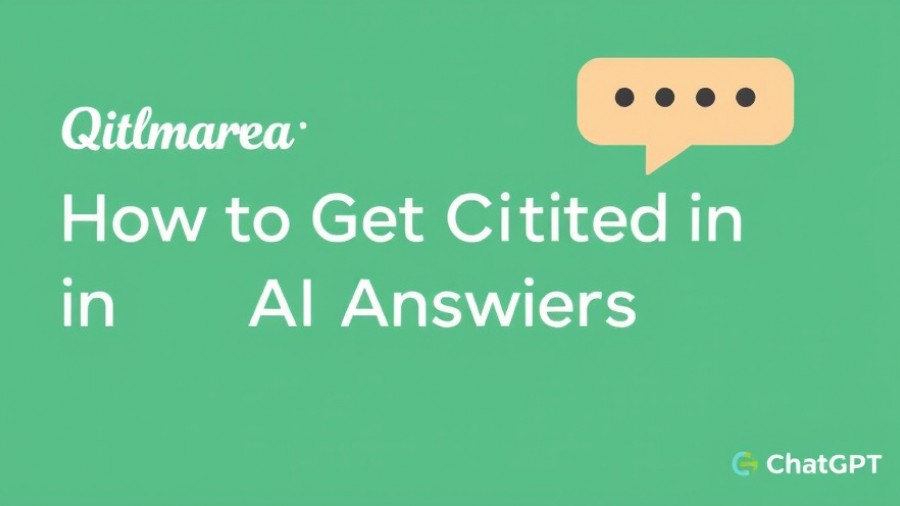
Unlocking ChatGPT SEO: The New Frontier for Businesses
As artificial intelligence continues to reshape how information is accessed and processed, understanding how to optimize content for AI-driven platforms like ChatGPT becomes crucial for small and medium-sized businesses (SMBs). This new form of search engine optimization, known as generative engine optimization (GEO), involves crafting content that increases the likelihood of citation in AI responses. With ChatGPT rapidly growing its user base, businesses must adapt their SEO strategies to ensure visibility where it counts.
Understanding Generative Engine Optimization (GEO)
The rise of AI models like ChatGPT represents a paradigm shift in search. Unlike traditional search engines that display a list of links, ChatGPT provides synthesized, conversational answers. Recognizing how this impacts content visibility in AI is essential for attracting potential customers. With reports showing that each visitor from an AI model is worth significantly more than a traditional search visitor, optimizing for ChatGPT becomes vital. To gain visibility through this platform, businesses must adjust their content strategies.
Why Your Brand Needs to Be Cited on AI Platforms
GEO is crucial not just for reaching a broader audience but also for capitalizing on lower competition compared to Google rankings. While classic SEO is highly saturated, fewer businesses are competing for AI citations. This means that the potential for your brand's visibility can significantly increase if you focus on creating content specifically tailored for AI. Interestingly, over 80% of sources cited by ChatGPT don't appear on the first pages of Google or Bing, providing a unique opportunity for niche sites and specialized content.
Key Strategies for Gaining Citations in ChatGPT
Businesses looking to enhance their visibility in ChatGPT need to consider several factors:
- Ensure Your Site is Crawlable: Make your website accessible to ChatGPT's crawler, as well as Googlebot and Bingbot. This means reviewing your robots.txt file to allow these crawlers appropriate access.
- Utilize Structured Content: Clear headings, bullet points, and logical hierarchy help both ChatGPT and human readers navigate your content easily. Offering concise summaries at the end of sections and incorporating frequently asked questions (FAQs) can enhance AI's ability to reference your content.
- Adopt Conversational Keywords: Shift your focus towards long-tail keywords and question-based phrasing. This mirrors user behavior as they engage with AI chatbots.
- Provide Authoritative and Insightful Content: In-depth, well-sourced articles with actionable insights can substantially improve your chances of citation, as AI models tend to favor robust content.
The Future Landscape of AI Content Optimization
The future of search is undoubtedly intertwined with AI. As ChatGPT and similar platforms evolve, businesses must focus on continuously refreshing and adapting their content to stay relevant in this changing landscape. Regularly monitoring site analytics and being responsive to changes in user behavior will allow businesses to stay ahead in AI optimization.
Tools to Stay Ahead
Leverage tools like Google Search Console and Bing Webmaster Tools to monitor your site's performance and identify areas for improvement. Additionally, utilizing structured data, or schema markup, can enhance visibility by informing search engines and AI chatbots about the content’s intent and context.
The Emotional Impact of Adapting to Change
As SMBs navigate this evolving terrain, there may be apprehension about adapting to new technologies; however, embracing these changes is a crucial step toward future-proofing your business. Engaging with AI audiences offers immense potential for growth and connection. With the right approach, the blend of clear, structured, and optimized content can ensure your brand remains a relevant player in the digital space.
In conclusion, the shift towards AI-driven search requires a proactive approach to GEO. By focusing on structured content, ensuring site accessibility, and leveraging conversational keywords, businesses can secure their position in an increasingly competitive landscape. This approach not only drives visibility but also opens new avenues for engagement. As you prepare your strategy, remember that adapting to changes will ultimately steer your brand toward greater resilience and success in a digital-first world.
 Add Row
Add Row  Add
Add 



Write A Comment